- Home
- Joanne Harris
Jigs & Reels: Stories Page 3
Jigs & Reels: Stories Read online
Page 3
For a moment I tried to conceive of not being an Ugly Sister. Ugly is a word I’ve dragged behind me all my life; it defines who I am. Without it, what am I? The thought made me shiver.
The stranger saw my expression. ‘These things are just part of the roles we play,’ he said. ‘The Good, the Bad, the Ugly. We’re heroes too, in our way. The ones of us who crawl away cursing when the curtain goes down. The discarded ones. The ones with no happy ever after. We belong together, you and I. After everything we’ve endured, we have a right to something of our own.’
‘But – the story,’ I said weakly.
‘We’ll write another story.’ He sounded very certain: very strong. I felt the last of my defences begin to crumble. Behind us, Cinderella’s Dance-a-Rama began to thump out a disco beat. Happy Hour was beginning.
‘But I don’t even know you!’ I protested. What I meant, of course, was that I did not know myself; that a lifetime of Ugly Sisterhood had robbed me of all other identity. For the first time in my life I felt close to tears.
The stranger grinned. He had rather large teeth, I noticed; but his eyes were kind.
‘Call me Wolfie,’ he said.
Gastronomicon
Some people have had a hard time reconciling the author of The Evil Seed and of Sleep, Pale Sister with that of Chocolat and Blackberry Wine. To help bridge the gulf, I wrote this – and because food can be frightening, too.
SOMETHING ALWAYS GOES wrong when we have guests to dinner. Last time it was a strange smell, the sound of clanking from somewhere within the walls and the sudden apparition of a small and incredibly ugly homunculus, which I hastily pushed into the garbage-disposal unit before it could step on the newly iced batch of fairy buns. The dining-room lights were lower than usual, and flickered with a strange reddish tinge, but everyone thought that was something to do with the wiring, and I got out of it easily enough by taking the coffee and after-dinner drinks into the lounge.
No one seemed to hear the distant slithering sounds from behind the serving hatch; or if they did, they were too polite to say anything.
It must have been the pudding.
Everything else was safe enough: prawn cocktail, then roast chicken, greens, roast and mashed potatoes, garden peas and carrots. Ernest would have had apple pie again after that; he always wants apple pie. But I thought we might try something a bit more exotic: a nice Black Forest Gâteau, perhaps, or a lemon torte. Of course, I’m always a bit limited by what Ernest will eat; there’s a whole section of the cookbook I never use because he won’t eat anything too fancy or too foreign. You’d never think that he’s part foreign himself; he’s so very English – always wears a tie when he goes out, never misses The Archers, votes Conservative and loves his Mum.
I only met her a couple of times, you know, when Ernest and I were courting. It took me a bit by surprise. She’d changed her name, of course, but I could tell she wasn’t from here. She had long black hair pinned back with a silver clasp, and very dark eyes. Ernest’s hair isn’t quite as dark, his eyes are hazel rather than brown and his skin doesn’t have that golden bloom, but I could still see the resemblance between them.
She was wearing English clothes, like Ernest, though she hadn’t managed it quite as well; her dress was all right, but she wasn’t wearing any stockings, and her feet were bare in her little golden sandals. Instead of a cardigan she had a sort of embroidered shawl, with some kind of writing around the edge in gold thread. I remember feeling secretly rather embarrassed that Ernest’s mother was so very foreign-looking; he seemed to feel it too, though he was clearly devoted to her. A bit too devoted, if you ask me; stroking her hair and fussing over her as if she were old, or sick. She was neither; she looked thirty-five at the most – and she was beautiful. That isn’t a word I tend to use about people, but there was no denying it; she was. It made me feel a bit uncomfortable; I’ve always been rather plain, and you know what they say about men and their mothers.
I never saw Ernest’s Dad. He was English, according to his Mum, but he’d moved away a long time ago, when Ernest was a boy. There were no photographs of him, and she didn’t seem to want to talk about it much.
‘The women of our family have never had any luck with men,’ was all she would say on the subject. I guessed his parents might have disapproved of a mixed marriage. Come to think of it, mine would have been none too pleased, if they’d found out.
Still, she seemed to approve of me. And after the wedding, she moved away – the family was from Persia, or one of those Arab countries, and although Ernest never said so, I had the impression she’d gone back home. I tried not to be too pleased about it, but secretly I was rather glad. I don’t know what our neighbours would have said if they’d seen her.
The cookbook was her wedding gift to us. Ernest seemed to know what it was as soon as he saw the big package wrapped in scarlet paper, and he caught hold of her by the shoulders and started talking to her very fast in a language I didn’t understand. His face was twisted with emotion, and I think there were tears in her eyes. I was relieved that there was no one else around to see them.
Finally Ernest took the package. I don’t know why I thought he looked reluctant to accept it. Then, with a glance at his mother, he gave it to me.
‘This is a family treasure,’ he told me gently. ‘It has been passed on from mother to daughter for generations. It’s the most precious thing she has. She says she knows it will be safe with you.’
His mother nodded silently, her eyes still brimming.
I tore off the scarlet paper (not very bridal, I thought to myself). To be honest, I couldn’t really see what the fuss was about. It was just an old book, leather-bound and worn dark with handling. The pages were unevenly cut and covered in tiny script. Some were stained and would have been illegible even if I’d known the language.
The pages were all of different thicknesses, and I could see that in some places notes had been written in the margins and around the foreign writing. Some had been pasted directly onto the page. At the front, extra sheets had been stuck into the book, and on these the handwriting was different. Some of it was in English, some in other languages that I recognized – mostly French and German. Inside the cover was what looked like a list of names.
‘All the women of our family,’ said Ernest’s mother, pointing. ‘All our names are written here.’
Only the last one was in English. Sulebha Alazhred Patel. A bit of a mouthful. No wonder she changed it.
‘Is it a cookbook?’ From the fragments of English script in the margins I could see lists of ingredients. ‘I’m quite keen on cooking.’
Ernest and his mother looked at each other.
‘Yes, a cookbook,’ she said at last. ‘A very old, very precious cookbook.’
‘It’s very – special – to my mother,’ added Ernest. ‘She has been its custodian since her mother died.’
‘Thank you,’ I said politely. ‘It’s lovely.’
That’s men for you, I thought to myself. Nothing ever compares to their mother’s cooking. I guessed that now Ernest would want me to prepare his mother’s recipes at home, and I hoped that they wouldn’t be too foreign. You know how the smell of curry lingers on soft furnishings. And in our neighbourhood – well, you know how people talk. And Ernest really does look so English.
I needn’t have worried. After his mother left, Ernest seemed much calmer. He’s a quiet man, really, not given to – well, passions, I suppose you’d say. The only occasion I ever saw him moved was that time with his mother. I would never have said so to Ernest, of course, but I really don’t think she was good for him. He’s much better without her.
I was right about the recipes, though. He’s always insisted that I use his mother’s cookbook, even if I have a similar recipe of my own. I didn’t like to at first – to tell you the truth, I wasn’t sure it was all that hygienic, with those stains and fingermarks all over it – but I got a plastic cover made, and after that it was less of a problem. And of
course Ernest is very set in his ways. He can tell if I’ve added an ingredient or changed a recipe by as much as a whisker, and can get quite annoyed if I introduce a variation. I’ve learned to stick precisely to the wording (very odd wording, too, in some cases, but that’s because some of the recipes are quite old), and not to experiment too much. He has his favourites, all of them from the front of the book: nice, traditional English recipes like shepherd’s pie or steak and kidney pudding. The rest of the book I never use. For a start, most of it is in Arabic or something. And from what I do understand, the recipes in that part are a bit too exotic for us anyway. I have to say I’m tempted sometimes, just to see what would happen, but I know what Ernest would say if I tried. Too fancy for me, love. What about a nice pork chop?
So now I stick to what he likes best. Apple pie and custard. Jam roly-poly. Bubble and squeak. Toad in the hole. He never says so, but I can guess that his mother used to make them for him when he was a boy. Perhaps his father liked them. I think it’s rather sweet, actually.
We’ve been lucky, Ernest and I. Just after we married he got a job with a big chemical firm: regular promotion, good hours, three weeks’ holiday a year. We bought a nice house on a new estate, and a sensible family car. We have two children, Cheryl and Mark, both nearly grown-up now, of course, and doing well at university. No serious illnesses, no disasters, not even a burglary. Last month Ernest got another promotion – he often does after one of my dinner parties, and jokes that it must be my home cooking that does it – to Regional Director. It isn’t a fortune, of course. But what would we want with more? I’m not a spender. I’m not one for furs or jewellery. We’ve got a nice comfortable house and a new conservatory to sit in. I have my flower-arranging class and Ernest has his golf. The kids are all right. We’re safe.
Still, I sometimes wonder what happened to the man I married. Oh, I’m not unhappy or anything like that. But I have to admit that although I’m relieved Ernest didn’t turn out to be one of those feckless men my mother used to warn me about, I do sometimes wonder what it would be like if he were more – well, passionate, I suppose. Just a little less English. I wonder what it would be like if, just once, we went to Bombay or Marrakesh for the holidays, instead of Skegness or Robin Hood’s Bay. If we could have a little danger, a little impulse for a change. If, just once, we could have Gobi Saag Aloo instead of steak and kidney pud.
Last month was our anniversary. Twenty-five years, would you believe it, our Silver Wedding, and I’d planned a special treat. Ernest was working late – demands of the new promotion – and I thought I might surprise him with a celebration dinner. I brought out the cookbook, turning automatically to the first section, transcribed almost entirely into English and quite legible in comparison with the rest.
In twenty-five years I’ve learned that anything from the first ten pages is safe. Oh, you do get the odd noises, strange smells, dimmed light, an impression of shifted perspectives, of walls sliding slyly to one side, but I think that’s a small price to pay for a really light Yorkshire pudding or a really fluffy curd tart. Even then, it’s usually only the first time you try the recipe that it happens; after that things settle down a bit. And they are excellent recipes; no skimping on ingredients, no shop-bought pastry, all spices ground by hand in the big stoneware mortar Ernest bought me for our first anniversary. I don’t begrudge a minute; cooking should take time. And I do enjoy it. I’ve never been one for these labour-saving devices – mixers and blenders and microwaves and the rest. Ernest calls them ‘flavour-saving devices’.
But twenty-five years, I said to myself. There must have been a thousand recipes in that old cookbook, and in twenty-five years I’d never gone beyond the first thirty or so. They were the most recent ones; I could tell that from the condition of the paper. The later pages were the colour of old baking parchment, and the writing was rusty and faded. There were virtually no English notes beyond the hundredth page, and even those were choppy and difficult to read. Pound a calabash of raw cornmeal with Dragon’s Blood in the moon’s last quarter . . . I mean, really.
Still, it wasn’t all as bad as that. Leafing through the book, I found several new recipes which sounded interesting without being too fancy. I’d already decided on roast lamb for the main course, and peach cobbler and ice cream for pudding, but I really wanted to make an effort with the starters. It wasn’t as if Ernest had actually told me not to go beyond the tenth page, I thought to myself, and after all, it was our anniversary. There are some occasions when even a perfect prawn cocktail just doesn’t fit the bill.
I found it about forty pages in. Some of the translation was in French, but I could understand most of it, and it really sounded rather nice. Besides, I reminded myself, I wasn’t too bad at French when I was a girl. I’d manage. Entrée. That meant a starter, didn’t it? I squinted down the list of ingredients. There didn’t seem to be a problem there. Some of the words were abbreviated – I assumed yog. stood for yoghurt – and the spellings were sometimes difficult to make out. The cooking time, too, was unclear – something which looked like long, which wasn’t much help – but I was sure that if I marinaded the meat with the herbs for an hour or two there would be plenty of flavour.
At first it was easy. I ground the herbs as usual in the mortar, then added a dash of dry sherry, the yoghurt and the sugar. It looked a bit pale, so I put in a teaspoonful of Gentleman’s Relish (the translation said rapace d’homme, which is probably the French version). The recipe just said viande, so I used a nice piece of chicken breast with the skin off, cutting it into strips then placing it in a dish with the marinade while I got busy with the lamb. It was getting quite dark, but it wasn’t until I was removing the skins from the blanched peaches that I noticed the kitchen spotlights had dimmed to tiny red pinpricks. There was a smell too; something like dustbins left out in the sun. It must have been coming from the neighbours’ side; I wipe the kitchen pedal-bin with bleach twice a day. Then there was the noise: a kind of deep pounding beyond the kitchen wall. Probably that teenage boy of theirs playing his hi-fi at full volume again; thank God we never had that kind of trouble with our two. I sprayed Kitchen Fresh into the air, and shut all the windows.
I was making the pastry for the cobbler when I heard the tolling; something like an underground bell repeating the same dull note over and over. It bothered me so much that I almost forgot to turn the marinaded chicken.
I looked at the kitchen clock. Ernest would be home at eight; that gave me just over an hour to get everything ready. If the lights were going to play up again, I’d have to put a couple of candles on the table. Come to think of it, that might make a nice change, I thought. Give the evening a bit of romance.
The lamb was perfect. I’d done some roast parsnips, mash and spring greens to go with it, and the peach cobbler was under the grill for that crunchy caramel-topping effect. I turned the chicken again in its marinade and poured myself a small glass of red wine as a reward.
Seven-thirty. I switched off the heat over the cobbler and left it to cool a little (it always tastes best warm rather than hot, with vanilla ice cream). I thought I might flash-fry the chicken and reduce the remaining marinade into a nice sauce. It was adventurous by Ernest’s standards, but I told myself that if he didn’t like the look of it I could always put a couple of prawn cocktails on standby.
The bell was still ringing. For a moment I considered knocking on the wall, but decided against it. It never pays to get into a quarrel with the neighbours. Still, I thought, they were off my Christmas card list from now on.
I put the radio on. There’s a station that plays classical music – nothing too fancy, just the hits – and I turned up the sound as high as I dared, so that I could hardly hear the ringing. That was better. I poured myself another glass of wine.
I left the oven on very low, just to keep the meat warm, and began to set the table. The floor felt uneven, the walls tilted slightly out of true, and the cloth kept sliding off onto the floor. I held it in place wi
th one of the silver-plated candlesticks, and put a centrepiece of red carnations in the middle. I shouldn’t have had the wine, I told myself, because now I felt dizzy, and my hand was shaking as I tried to light the candle, so that the flame kept blowing out. That smell was back, too – something hot and sweaty – and I could hear the sound of the bell even above the radio. In fact, there was something wrong with the radio station, because every now and then the music cut out and gave a great dry hiss of white noise that made me jump. The room had got very hot – it always does when I’ve been cooking – so I turned the thermostat down and fanned myself with a copy of the Radio Times.
A quarter to eight, and it was stifling. I hoped there wasn’t going to be a storm; it really had got very dark. The radio was producing virtually nothing but white noise now, quite useless, so I turned it off, but I could still hear that hissing in the distance, a sort of dry, slithery desert sound. Perhaps it was something to do with the electrics. Behind it the bell still rang, and for the first time I was grateful. I got the feeling that if it stopped ringing I might hear those other sounds more clearly than I wanted to.
I sat down. There was a draught coming from somewhere, but it was hot air, not cold. I checked the kitchen to make sure I hadn’t left the oven door open. Everything looked fine. Then I noticed that the serving hatch was open a couple of inches. Red light shone through onto the worktop. The kitchen door swung shut, very gently, with a small click.
I’ve never been what you’d call a fanciful woman. That’s one of the things that Ernest appreciates most about me; I’m not one to make a fuss. But when that door closed I began to shake. The sounds coming from behind the serving hatch were louder now: a single bell tolling; a thick dragging sound and something which might almost have been voices; murmuring, clotted voices, but in no language I knew or could recognize. The light that fell across the worktop didn’t look like electric light at all; it was more like a kind of daylight, but redder, darker somehow, as if it was coming from a sun much older than ours. I could almost imagine that there was no dining room beyond the serving hatch any more, but another place altogether: somewhere terribly old, terribly barren; somewhere hissing with dust, where the broken walls of once-fabulous cities were now no more than hummocks in the sand; and that where the red sky met the red earth things moved and slouched, things beyond perspective and (thankfully) beyond imagination. I reached out my hand slowly to close the serving hatch, but as I inched closer I was suddenly sure that on the other side, another hand – something grossly, unimaginably different – was also moving ponderously towards the tiny space; that I might feel the graze of its fingers as it met mine; and that if I did I would scream and scream and never be able to stop screaming . . .

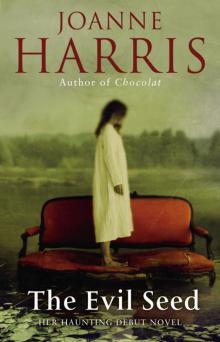 The Evil Seed
The Evil Seed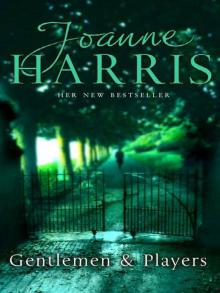 Gentlemen and Players
Gentlemen and Players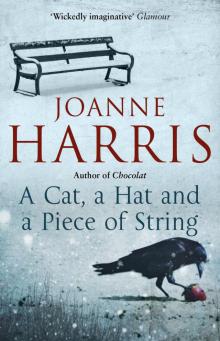 A Cat, a Hat, and a Piece of String
A Cat, a Hat, and a Piece of String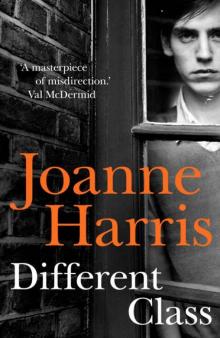 Different Class
Different Class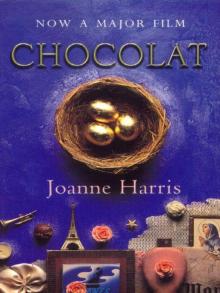 Chocolat
Chocolat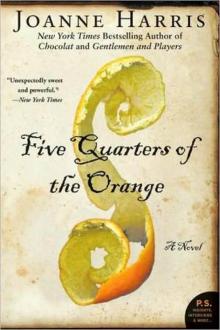 Five Quarters of the Orange: A Novel
Five Quarters of the Orange: A Novel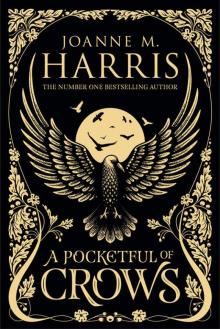 A Pocketful of Crows
A Pocketful of Crows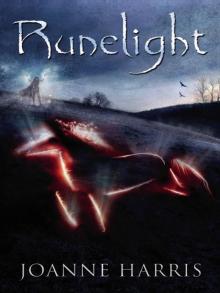 Runelight
Runelight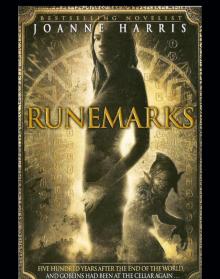 Runemarks
Runemarks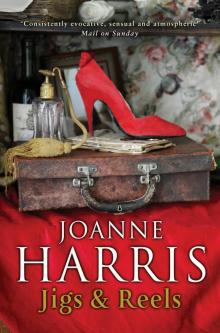 Jigs & Reels: Stories
Jigs & Reels: Stories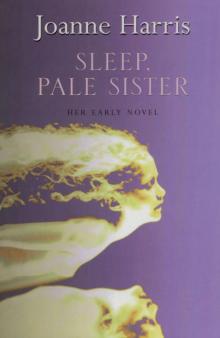 Sleep, Pale Sister
Sleep, Pale Sister Holy Fools
Holy Fools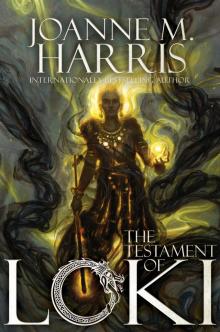 The Testament of Loki
The Testament of Loki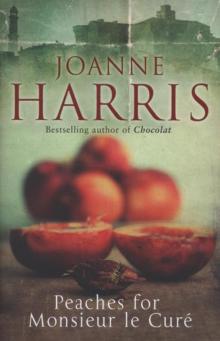 Peaches for Monsieur Le Curé
Peaches for Monsieur Le Curé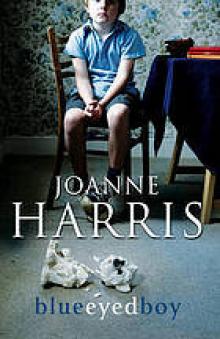 Blueeyedboy
Blueeyedboy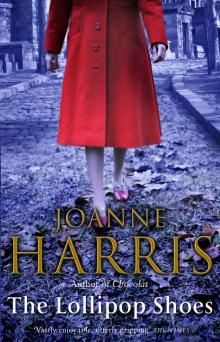 The Lollipop Shoes
The Lollipop Shoes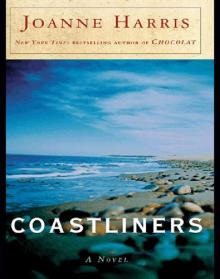 Coastliners
Coastliners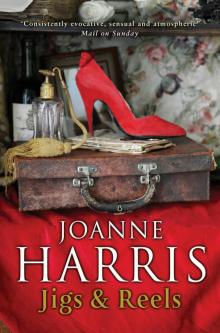 Jigs & Reels
Jigs & Reels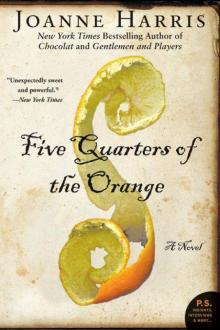 Five Quarters of the Orange
Five Quarters of the Orange